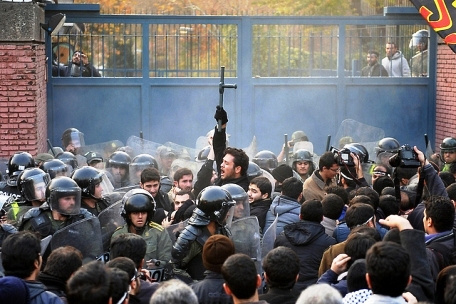A Historical Mistake in Confronting the Britain

Note: this piece was originally published on Thursday, December 1, 2011 on the moderate Conservative website Alef.ir which belongs to Principlist lawmaker Ahmad Tavakkoli. So far, the controversial piece has received 336 comments, with an additional 203 comments regarded as ‘un-publishable’ by the website. The text draws heavily on rhetorical question as a common polemic device in Persian writing, to substantiate its argument.
By: Yaser Sobhani-Fard
The recent developments taking place with regard to our relations with the British government will bring serious repercussions for our country. It seems that the historical mistake of occupying the British Embassy in Tehran was the product of the enthusiasm bubble created by certain media in the first place. At the moment, what we need is a return to rationality to quell the perpetuation of such emotional moves in order to prevent further damage to our national interests and the Islamic Republic’s international image. Before continuing this essay, to avert any slander, the author takes the opportunity to remind that he is not incognizant of the fact that for Britain, Iran has always been a mouthwatering prey and London has proven its hostility towards the Islamic Republic wherever and whenever possible. To date, Tehran’s relations with London have defied the cost-benefit principle. Nonetheless, Tuesday’s big mistake calls for elaboration on some key issues:
1. The Pointlessness of Severing Ties with Britain
In the present situation, Tehran-London ties are best described as ‘insignificant’. The level of trade and the record on mutual visits clearly attest to this argument. Thus, these questions arise: why did the Iranian Parliament decide to downgrade ties with Britain? Was it trying to punish the country? Could this measure actually harm Britain or was it merely a gimmick? Could such publicity stunts serve Iran's interests? How could downgrading an immaterial relationship possibly help us? Expelling the British ambassador to Tehran was as pointless as London’s boycotting Iran's Central Bank, but should we retaliate against the enemy by ineffective bills or rational punitive measures?
2. A Measure to Tarnish Iran's International Image and Verify the West’s Dual Standards
The attack on Britain’s Embassy was first and foremost an attack on Iran’s cultural values and the ethics-bound rule of the Islamic Republic. Any country’s embassy is regarded as a part of its territory according to diplomatic conventions. Thus, any violation targeted at an embassy is tantamount to a violation of the country’s soil. While diplomatic efforts have concentrated on proving our advocacy of peace and our commitment to international rules and regulations, the primary message sent by the Tuesday raid on the British Embassy is nothing but Iranians’ tendency to break the law. The West can now substantiate its argument on why it can enjoy nuclear energy but countries such as Iran can’t: countries that overlook the most basic international norms and allow for the seizure of another country’s embassy and the desecration of its national symbols, would allow themselves to construct and even use a bomb when they acquire the know-how. The proceedings of Tuesday evening in Tehran tallied with the West’s arguments aimed to disregard our inalienable [nuclear] right and lent credence to the West’s dual standards. The massive media blitz of West leveled at Iran compares our country to a child ineligible to hold a table knife since it would harm itself or others. In the same picture, the US and other Western countries are depicted as mature adults qualified to wield a knife, even for purposes other than conventional ones.
3. When Even Our Religion Denies Such Moves
One can also prove from a faith-based approach that Islam does not approve of such acts either. As one reads in the Quran: “do not say crude words to those who call upon other than Allah, lest they use crude words about Allah in revenge without knowledge. As such we have made the actions of each nation seem pleasing. To their lord they shall return, and he will inform them of that they were doing.” (6:108) Doesn’t the Tuesday seizure defy this verse? Wouldn’t Britain or any other enemy allow itself to take the same measure towards our embassy in their country, while we would have to watch how they hurl insults at our flag and national symbols? Aren’t groups such as the Mujahedin-e Khalgh Organization (MKO) or other IRI opposition groups liable to do such acts? Could we approve of what the Taliban did to Iranian diplomats in our Mazar-e-Sharif consulate? Supporting such actions would just end in a dog-eat-dog situation.
4. The Unacceptable Culture of Brawling
Actions such as the Tuesday takeover of the UK Embassy are untenable, even in a ‘brawl culture’. Are we authorized to enter somebody’s house and damage their possessions when we are engaged in a fight with them? Did we have to enter the British Embassy in Tehran with an excuse that they have imposed sanctions and conspired against us? Such measures only tarnish Iran's international image and scare away other countries from reinforcing ties with Iran. They may ask themselves if it would be worth it to have relations with Iran and have both good and bad days in an ordinary fashion. A reasonable mind agrees that if the British government is acting with hostility towards Iran, we have the right to sever bilateral ties or retaliate. But should we do this by taking over their embassy? With such mistakes, we cast doubt on our own credibility and give substance to the enemy’s allegations. It is the responsibility of the Iranian government to solve the problem in the best way possible.

